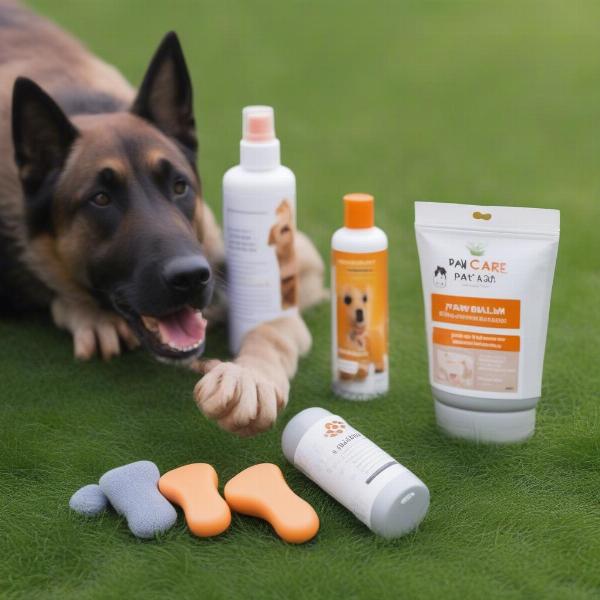If you’ve noticed your dog’s paws are swollen, it’s natural to be concerned. Swollen paws in dogs can be caused by a variety of factors, ranging from minor irritations to serious medical conditions. This article will guide you through the potential causes, treatment options, and when it’s crucial to seek veterinary attention. Understanding what to look for and how to respond can help keep your furry friend happy and healthy.
Several common reasons can lead to swollen paws in dogs. Allergies, whether environmental or food-related, can trigger inflammation and swelling. Foreign objects like thorns, glass shards, or even small pebbles lodged in the paw can cause localized swelling and pain. Infections, often bacterial or fungal, can also lead to significant paw swelling. Trauma, such as sprains, fractures, or burns, is another potential culprit. Insect bites or stings can cause an allergic reaction resulting in swelling, and in some cases, underlying medical conditions like arthritis or immune disorders can manifest as paw swelling.
Identifying the Cause of Swollen Paws
Determining the underlying cause of your dog’s swollen paws is the first step towards effective treatment. Look closely at the affected paw. Is there any visible foreign object? Are there signs of a bite or sting? Does the swelling appear localized, or is the entire paw affected? Observe your dog’s behavior. Are they limping or avoiding putting weight on the paw? Are they excessively licking or chewing at the paw? These observations can provide valuable clues for your veterinarian.
Home Care and Treatment Options
For minor paw irritations, you can try some home care remedies. Soaking the affected paw in warm Epsom salt water can help reduce swelling and soothe inflammation. epsom salt for dogs paws provides further information on this topic. Ensure your dog doesn’t lick the Epsom salt solution, as ingesting large amounts can be harmful. Keeping the paw clean and dry can also aid in healing. However, it’s crucial to remember that home care should never replace professional veterinary advice, especially if the swelling is severe, persists, or is accompanied by other symptoms.
When to Seek Veterinary Attention
If your dog’s paw swelling is significant, accompanied by pain, limping, or other signs of distress, it’s essential to consult a veterinarian immediately. Similarly, if the swelling doesn’t improve within a day or two with home care, or if it worsens, a veterinary examination is warranted. dog foot swollen discusses more serious cases of paw swelling. Your veterinarian can diagnose the underlying cause and recommend the appropriate treatment, which may include antibiotics for infections, pain medication, or other interventions depending on the diagnosis.
Preventing Swollen Paws
While not all causes of swollen paws are preventable, you can take steps to minimize the risk. Regularly check your dog’s paws for foreign objects, especially after walks in areas with potential hazards. Keep your dog’s nails trimmed to prevent injuries. swollen red dog paw offers more advice on paw care. Protect your dog’s paws from extreme temperatures by using paw balm in winter and avoiding hot pavement in summer.
 Preventing Paw Swelling in Dogs
Preventing Paw Swelling in Dogs
Conclusion
Swollen paws in dogs can indicate various underlying issues. By carefully observing your dog, providing appropriate home care when necessary, and seeking timely veterinary attention, you can ensure your furry companion receives the best possible care. Remember, early intervention is key to preventing complications and promoting a speedy recovery. dog paw pad swollen can offer additional insights.
FAQ
- Can I use human anti-inflammatory medication on my dog’s swollen paw? Never give your dog human medication without consulting your veterinarian. Many human medications are toxic to dogs.
- How can I tell if my dog’s paw is infected? Signs of infection include redness, heat, pus, and a foul odor.
- What can I do if my dog keeps licking their swollen paw? A cone or Elizabethan collar can prevent licking and allow the paw to heal.
- Are certain breeds more prone to paw problems? Some breeds with hairy paws may be more susceptible to matting and infections.
- Can allergies cause paw swelling in dogs? Yes, allergies are a common cause of paw swelling in dogs.
- How long does it take for a swollen paw to heal? Healing time depends on the cause and severity of the swelling.
- When should I be concerned about my dog’s swollen paw? If the swelling is severe, persists, or is accompanied by other symptoms, consult your veterinarian.
ILM Dog is a leading international pet website dedicated to providing expert advice on dog care and wellbeing. We offer a wide range of resources on dog breeds, health, training, nutrition, grooming, and much more. From puppy care to senior dog support, ILM Dog is your trusted source for all things canine. For expert guidance and personalized support, contact us at [email protected] or +44 20-3965-8624. Visit ILM Dog for more valuable information to help you provide the best possible care for your furry friend.